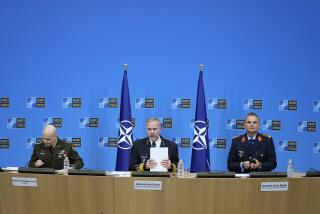Troops to Use Broad Rules of Engagement
- Share via
WASHINGTON — American military forces sent to Bosnia-Herzegovina to enforce a new peace accord are expected to operate under unusually broad rules of engagement that would allow them to fire on anyone they consider threatening, even if they are not attacked first, U.S. officials said Wednesday.
The wide-ranging authority is intended to minimize the risks faced by U.S. and allied troops making up the 60,000-member NATO-led peacekeeping contingent.
Although President Clinton has said he will not deploy any U.S. troops until the peace agreement is formally signed, about 1,600 members of U.S. military advance teams are slated to arrive in Bosnia next week to start setting up communications, electric power and security.
A larger U.S. force--including tanks, other heavy equipment and up to 23,000 American ground troops, mainly from U.S. Army bases in Germany--is expected to follow in mid-December.
Besides the signing of the peace accord, the deployment also depends on final approval of the overall military plan by Clinton--in consultation with Congress--and upon actions to be taken by the three warring Balkan factions to show that they will cooperate with NATO.
Administration officials hope that the unusually tough rules of engagement, along with a major appeal by Clinton for public support for the mission, will reduce some of the current opposition to the planned deployment, both among voters and members of Congress.
The peace accord also gives broad authority to the commander of the NATO force--U.S. Adm. Leighton W. Smith--to decide what sort of activities violate the pact and to take any action he sees fit to stop them.
U.S. military officials said Wednesday that the document is unprecedented for a peacekeeping mission of this sort. The powers ceded to the North Atlantic Treaty Organization essentially are those assumed by an occupying army, as in Japan after World War II.
Technically, the peacekeepers’ mission is a simple one. They are to separate opposing armies, supervise their withdrawal behind demilitarized zones and monitor their activities to make sure they follow the accord.
The agreement, endorsed Tuesday by the three warring Balkan factions, also requires that each army ceases virtually all military activity, pulls back from designated areas according to a fixed timetable and keeps authorities posted on the whereabouts of all forces.
The Balkan commanders must also keep all their aircraft grounded, shut down their air-defense radar systems within 72 hours after the peace accord is signed, and release and transfer all military and civilian prisoners.
At the same time, the three factions--the rebel Serbs, Bosnian Muslims and Bosnian Croats--are being ordered to disarm all paramilitary units and civilian groups that might pose a threat to NATO forces and to oust any foreign soldiers of fortune.
The 19-page military annex to the peace document, worked out by U.S. and Balkan generals, also gives NATO full control over all military movements by Balkan troops, as well as over all airspace over Bosnia.
Pentagon officials said Smith will be able to use whatever force he believes is needed to ensure that the Balkan armies comply with the accord.
U.S. officials said any violators would face aggressive retaliatory attacks, particularly in the early stages of the deployment, to discourage flouting of the peacekeepers’ authority.
The rules are far tougher and more sweeping than those used in other peacekeeping missions in which U.S. troops have taken part, such as in Somalia and Haiti.
In Somalia, U.S. soldiers were restricted in when and how they could fire their weapons, and Somali militia units were permitted to keep and use most of their weapons.
U.S. troops deployed in Haiti had fewer restrictions on the use of their weapons, but they let Haitian authorities take the lead whenever possible.
Except for an initial mandate by the U.N. Security Council, the United Nations has been written out of the Balkans peace agreement entirely.
NATO commanders--most of them U.S. generals and admirals--have authority to make decisions almost solely on their own.
U.S. officials said Wednesday that one strength of the Bosnian accord is that it obligates the warring factions to pave the way for the entry of NATO forces before any deployment and to cooperate with them once they arrive.
Lt. Gen. Wesley Clark, who served as a negotiator for the Joint Chiefs of Staff, told reporters that “if [those] conditions aren’t met, we’re going to have to take that into account in terms of our deployment.”
More to Read
Sign up for Essential California
The most important California stories and recommendations in your inbox every morning.
You may occasionally receive promotional content from the Los Angeles Times.













